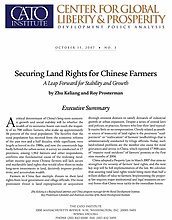Farmers in China face multiple threats to their land rights from local government and village officials. The most prominent threat is land expropriation or acquisition through eminent domain to satisfy demands of industrial growth or urban expansion. Despite a series of central laws and policies, in practice, farmers who lose their land typically receive little or no compensation. Closely related as another source of insecurity of land rights is the persistent “readjustment” or “reallocation” of farmers’ landholdings that is administratively conducted by village officials. Today, such land-related problems are the number one cause for rural grievances and unrest in China, which reported 17,900 cases of “massive rural incidents” of farmers’ protests in the first nine months of 2006.
China adopted a Property Law in March 2007 that aims to strengthen the security of farmers’ land rights, and the next key step will be full implementation of the law. We calculate that securing rural land rights would bring more than half a trillion dollars of value to farmers. Implementing the property law requires major institutional and legal measures on several fronts that China must tackle in the immediate future.

